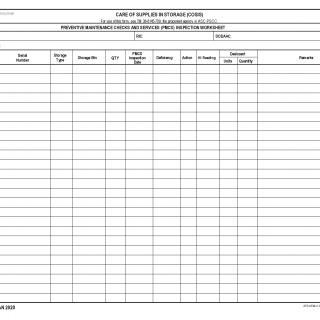DA Form 7790. Care of Supplies in Storage (COSIS)
DA Form 7790, or Care of Supplies in Storage (COSIS), is a document used by the U.S. Department of Defense (DoD) for conducting inspections of stored supplies and materials. The form's primary purpose is to ensure that supplies are properly stored, maintained, and protected to prevent damage or deterioration during storage. It is an essential tool for maintaining the integrity and readiness of military supplies, equipment, and assets.
Usage Case: The DA Form 7790 is used in various military and defense contexts:
-
Preventive Maintenance Checks and Services (PMCS): Military personnel, including inspectors, use this form to conduct systematic inspections of supplies and equipment in storage. The inspections help identify any deficiencies, damage, or issues that may compromise the quality or functionality of stored items.
-
Compliance Verification: The form helps verify compliance with storage requirements, ensuring that supplies are stored in the appropriate conditions and locations. This is crucial for maintaining the longevity of military assets.
-
Documentation and Reporting: Military units and personnel complete this form as part of their routine maintenance and inspection procedures. It serves as an official record to document the condition of stored supplies and any required corrective actions.
-
Asset Readiness: By addressing deficiencies and implementing proper storage practices, the DA Form 7790 contributes to ensuring that military assets are readily available and operational when needed.
Form Structure:
DA Form 7790 consists of multiple sections and fields designed for inspections, documentation, and reporting. These include:
Section 1: Inspector's Information
- Inspector's Name: The name of the person conducting the inspection.
- RIC (Routing Identifier Code): A code used for routing and tracking military supplies.
- DODAAC (Department of Defense Activity Address Code): A code used for identifying specific military units or organizations.
- Installation/Unit Name: The name of the military installation or unit where the inspection is taking place.
- NIIN (National Item Identification Number): A unique identifier for each item being inspected.
Section 2: PMCS Inspection Worksheet
- A detailed worksheet used for conducting the PMCS inspection. This section includes tables, columns, and rows to record inspection data.
Section 3: Irreversible Humidity Indicator
- Information regarding irreversible humidity indicators to monitor moisture levels in storage.
Section 4: Item Deficiencies
- A list of common deficiencies or issues that may be encountered during the inspection, including details on items, packaging, and containers.
Section 5: Unit Package Deficiencies
- Similar to Section 4 but specifically focusing on unit packaging and container deficiencies.
Section 6: Storage Deficiencies
- Information regarding storage conditions and deficiencies, such as improper storage locations or exposure to the elements.
Section 7: Compliance Verification
- Verification of compliance with requirements, including ISPM 15 (International Standards for Phytosanitary Measures) markings for solid wood components.
Section 8: Reversible Humidity Indicator
- Information regarding reversible humidity indicators for monitoring moisture levels in storage.
Section 9: Care of Supplies in Storage (COSIS)
- A summary of the purpose and use of the form, citing the relevant procedures.
Additional Information:
- The form includes fields for recording inspection dates, action taken, remarks, quantities, and storage details.
- It provides multiple sections for addressing different types of deficiencies, such as item, packaging, container, and storage-related issues.
- The form may include examples and legends to clarify specific information or requirements.
- Use of the most recent edition of DA Form 7790 is essential, as previous editions are considered obsolete.
- The form may be submitted in different formats, including XML or PDF data, via email, for proper record-keeping and reporting.

